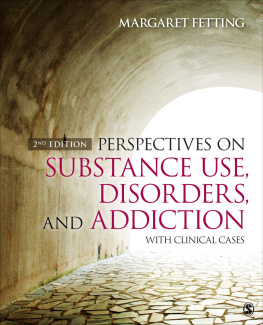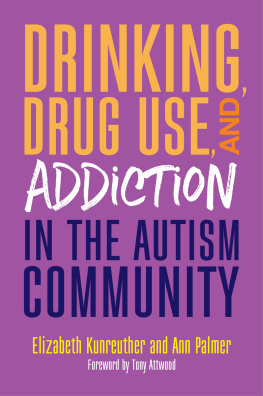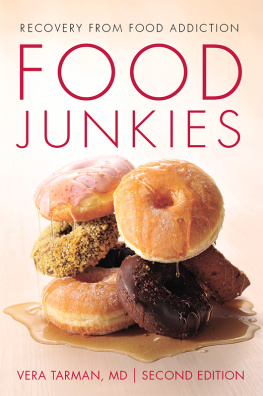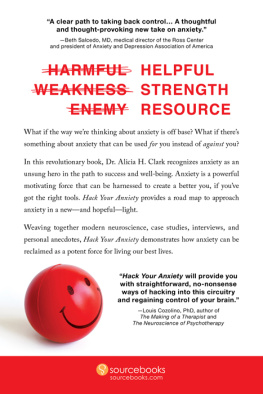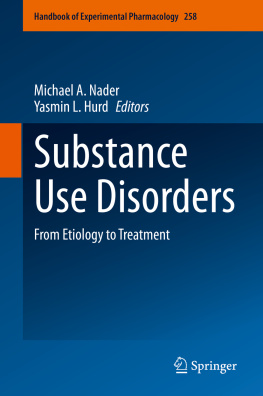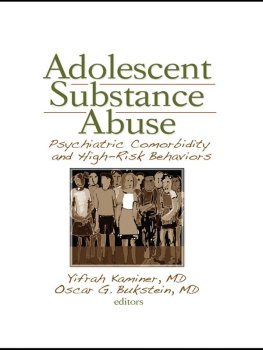FOR INFORMATION:
SAGE Publications, Inc.
2455 Teller Road
Thousand Oaks, California 91320
E-mail: order@sagepub.com
SAGE Publications Ltd.
1 Olivers Yard
55 City Road
London, EC1Y 1SP
United Kingdom
SAGE Publications India Pvt. Ltd.
B 1/I 1 Mohan Cooperative Industrial Area
Mathura Road, New Delhi 110 044
India
SAGE Publications Asia-Pacific Pte. Ltd.
3 Church Street
#1004 Samsung Hub
Singapore 049483
Copyright 2016 by SAGE Publications, Inc.
All rights reserved. No part of this book may be reproduced or utilized in any form or by any means, electronic or mechanical, including photocopying, recording, or by any information storage and retrieval system, without permission in writing from the publisher.
Printed in the United States of America
Library of Congress Cataloging-in-Publication Data
Fetting, Margaret.
[Perspectives on addiction]
Perspectives on substance use, disorders, and addiction: with clinical cases / Margaret Fetting, University of Southern California.Second edition.
pages cm
Revision of: Perspectives on addiction / Margaret Fetting. 2012.
Includes bibliographical references and index.
ISBN 978-1-4833-7775-9 (pbk.: alk. paper)
1. Substance abuse. 2. AddictsFamily relationships. 3. Ethnopsychology. I. Title.
HV4998.F48 2016
616.8606dc232015024098
This book is printed on acid-free paper.
Acquisitions Editor: Kassie Graves
eLearning Editor: Lucy Berbeo
Editorial Assistant: Carrie Montoya
Production Editor: Bennie Clark Allen
Copy Editor: Talia Greenberg
Typesetter: C&M Digitals (P) Ltd.
Proofreader: Kristin Bergstad
Indexer: Julie Grayson
Cover Designer: Rose Storey
Marketing Manager: Shari Countryman
Preface to the Second Edition
I have been teaching, writing, and clinically practicing in the substance use disorders (SUDs) field for nearly 3 decades. I remain endlessly fascinated and intrigued by our individual relationships with alcohol and drugs, including during pleasurable states of intoxication, during destructive states of excess, or during lifetimes of refrain.
My first text, Perspectives on Addiction (2012), presented readers with the knowledge base that I developed during my years of teaching graduate students in the School of Social Work at the University of Southern California, as well as other Los Angeles and European universities. Course content included many of the professionally agreed-upon areas of study in the substance use disorders field including sociocultural influences, psychoactives and the brain, models of treatment with brief and long-term interventions, evidence-based treatments, psychopharmacology, and the use of support groups.
My 2012 text emphasized the importance of addressing, assessing, and exploring our unique relationship with substances of pleasure with the help of 12 clinical sketches. I also combined a psychoanalytic attitude and sensibility with the more traditional mindset of the substance use disorders field. Substance use disorders treatment is deepened when a nondirective, reflective analytic perspective and attitude are coupled with the sometimes inflexible and confrontational approaches of traditional recovery treatments. Perspectives suggests that the combination of these two clinical styles promotes more engaging treatment.
This second edition of Perspectives on Substance Use, Disorders, and Addiction is a philosophical, sociocultural, and clinical text that presents a refreshing blend of ancient and contemporary ideas on the natural pleasures and potential powers of alcohol and drugs in our everyday individual and collective lives. This edition of Perspectives emphasizes each persons unique ego syntonic or dystonic relationship with both substances and non-substance-related behaviors of pleasure. Hopefully, these perspectives will help the reader detangle some of the sentimental, overvalued, and misguided ideas that currently muddle the substance use disorders field.
Readers of both books will notice that I have undergone an energetic evolution in my philosophical approach to substance use and its disorders since writing my first edition 6 years ago. At that time, I began living and working in Europe, and this resulted in my developing a broader conceptualization of the place of drinking and drugging in our lives, including more flexible responses to problematic or excessive use.
Other forces influencing my evolution in thinking include the following developing perceptions: that we have overvalued the prevalence of true addiction in this country and undervalued the universal desire to escape reality with alcohol and other drugs (AOD); that we have underappreciated the fact that people will naturally have problems managing something so pleasurable and have oversold the universal prescription of abstinence for all nature of problems; that the DSM-5 spectrum approach to diagnosis introduced a radical shift in our conceptualization of problems with AOD; that, as a culture, we seem to have compulsively adopted the disease model of thinking and are having a hard time accepting and integrating more wide-reaching, inclusive, and flexible approaches; that we have neglected to integrate the thinking and experiences of other parts of the world that have a decidedly different orientation toward alcohol, drugs, pleasure, and excess; and finally, that we have not yet linked the rising rates of addiction with our individual and cultural attempt to self-medicate the disorienting anxieties generated from the impact of our 24-hour globalized world.
Europeans approach to drinking piqued my curiosity, which led me to study the place of alcohol in ancient Greek culture. What I discovered was enlightening and seemed a particularly useful perspective for challenging some of the rigidity that exists in the field today. In the rough-and-tumble of polemics and politics, we have lost an appreciation of the basic fact that human beings like to escape consciousness and reality with the help of alcohol and other drugs. This desire is benign, not sinister or sinful; nor are its excesses necessarily pathological. Help or assistance with problems can be convivial and, at the same time, exact responsibility for our countenance. A symposium approach to treatment, developed from ancient philosophies as well as the current DSM-5 spectrum, is presented that is based on the fourth drive, psychoanalytic concepts for deepening the therapeutic relationship, harm reduction, and self-medication.





